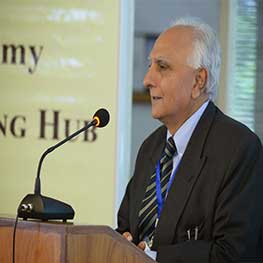Dr. Shahid Amjad Chaudhry
It is a pleasure to introduce the papers and proceedings of the 16th International Conference of the Lahore School of Economics, on Management of the Pakistan Economy.
The COVID epidemic of 2019-20 led to a huge decline in economic activity all over the world. And as you remember, commodity prices collapsed, oil prices collapsed, and as we were coming out of it, the Ukraine war started. Following this, oil prices went from $30-$40 to $120 per barrel, energy prices more than doubled and food prices went up dramatically on Pakistan. These conference proceedings discuss the impact of these shocks as well as the current state of the Pakistani economy.
Two or three important points emerge from these conference papers: One is that while we may be tempted to think that the situation was beyond the control of policymakers, it is a source of immense satisfaction that Pakistan has managed the situation. Thanks to the skill of our policymakers, in the State Bank, in the Ministry of Finance, the Ministry of Commerce, and other ministries, we have managed to sustain the Pakistani economy. It is still facing significant challenges but it is steady and I would like to compliment the policymakers, the academics and all of the stakeholders including the international finance institutions and friendly countries for supporting Pakistan over the last three or four years which have been extremely challenging.
Second, we need to take stock of the present situation. The first thing which immediately comes to mind is that the economy has slowed down dramatically with an estimated growth rate of 0.5 percent in 2022-23. Also, our foreign exchange reserves only cover 3 months of imports. The exchange rate has adjusted very dramatically and inflation is extremely high.
But then the question arises of where do we go from here? To answer this, it is important to make some important observations. The first observation is that despite our current state of difficulties and the strict economic programs under which we are trying to operate, we must continue to make a major effort to support and maintain Pakistan’s social safety nets. And by this I mean that we should try to maintain income transfer programs and our health programs for alleviating poverty, which we already have in more than three quarters of the country. So we should maintain, and if possible expand, the Benazir Income Support Program and associated parts of to reduce the burden on the most susceptible members of our society.
The second observation is that we have let our external debt grow to unsustainable levels. This may have been well-intentioned since we have been borrowing heavily in the past and we built up a fair amount of infrastructure. But when the external shocks occurred, the country struggled to get additional money which left us extremely vulnerable. Therefore, I believe that better debt management is essential. And here we need to focus more, in addition to the formal official debt, on contingent liabilities. The Pakistani state has exposed itself to a huge amount of contingent foreign liabilities. I would like to propose that as we take on contingent liabilities, we should put them through the same test which we do from our foreign borrowing, which is that wherever there is a government guarantee, of any particular type, particularly with regard to rates of return, fixed prices, guaranteed repayments, etc., we ask the planning commission to review those contingent liabilities as part of our project evaluations process, even if these projects are in the private sector.
Another issue that needs to be addressed is the need to substantially strengthen the public procurement regulatory, and I would like to extend this not only to the purchasing by our state-owned enterprises, but also for the purchase of critical energy imports by both state and non-state oil companies that sell in Pakistan’s regulated energy sector. It is critical that the established procurement procedures be followed and the regulatory process be transparent in order to ensure competitiveness prices and efficiency. And I would also like to suggest that the entire procurement process, as well as instances where exceptions are made, be fully transparent and available on relevant government websites.
The final issue that I would like to highlight is the need to clearly articulate and then ensure the fundamental economic rights of the people of Pakistan. The fundamental right of education is an accepted right but must move to also including health and food security to the list of fundamental rights. These fundamental rights must be backed by clear policies and significant budgetary allocations since these rights are essential for long-term growth which is sustainable and equitable.
I am sure that the papers in this volume will be essential for policymakers, academics, students and stakeholders and I look forward to the important discussions that arise as a result of the work done by the contributors
Dr. Shahid Amjad Chaudhry Rector
Lahore School of Economics
 Innovation and
Innovation and 